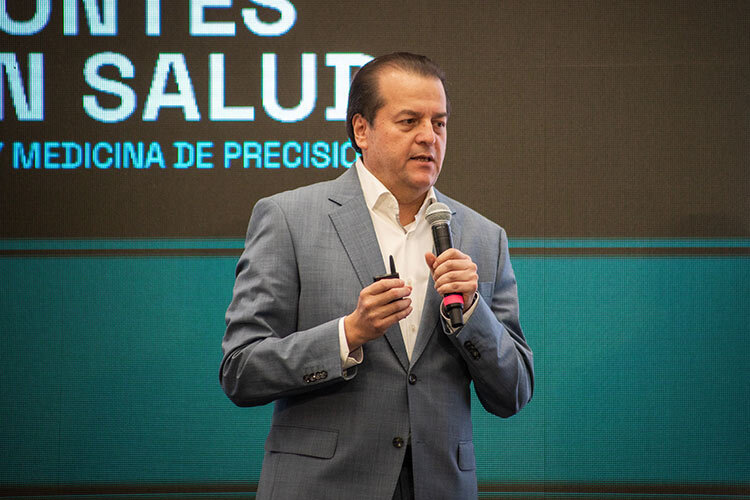The move toward a healthcare system based on precision medicine must be gradual but steady. Its implementation can lead us to more effective, patient-centered medicine. To achieve this, it is important to integrate a strategic model of four “P”s.
According to Luis Herrera, Dean of the School of Medicine and Health Sciences at Tec de Monterrey, during his participation in The Next Decade, a forum organized by Tec de Monterrey under the motto “Horizons in Health”, which brought together specialists from different institutions in the country.
“Precision medicine has to do with each person’s individual sensitivity. Unlike a standard treatment, this approach seeks the correct procedure for each patient, using their genetic and biochemical information,” said the researcher.
With precision medicine —he explained— it is possible to impact all stages of a disease, since it is possible to select the drug, the dosage, and the timing of administration, by mapping the current and progressive state of each patient.
Although efforts and advanced technologies already exist that make it possible to apply this innovative medical approach, in order to achieve public precision health, four characteristics must be considered: being preventive, personalized, predictive, and participatory.
Preventive
Precision medicine has an important role in the prevention and early detection of diseases, especially in cases of genetic or hereditary origin, such as certain types of cancer.
“Although cases of hereditary cancer represent a smaller percentage of the total, their early detection has a significant impact on public health, as it allows for prophylactic treatments that reduce the risk of developing a disease or prevent tumors from advancing to severe stages,” he added.
This not only reduces the cost of treatment but also increases the chances of its success.
As evidence, he presented the results of the Target study, conducted in 2019, in which out of 100 cancer patients with different types of tumors, 11% of them were selected to undergo a precision treatment through a process called genetic characterization of tumors.
“Four percent of the patients had a positive response to the treatment, leading to the conclusion that precision medicine can be an acceptable method for patients in early stages,” he said.
Personalized
Precision medicine starts from the recognition of the biological and genetic individuality of each person. With this knowledge, treatments are specifically adapted according to the patient’s molecular characteristics.
Herrera presented the case of a targeted therapy using specific antibodies in patients with melanoma, an approach that improved their survival.
Predictive
The researcher mentioned that there are technological tools, such as artificial intelligence and radiogenomics, that are essential for anticipating the response to certain specific treatments.
“In health, the same preventive measures cannot be applied to all populations. There are AI tools that can already accelerate the identification of patterns, and thus predict sensitivity or resistance to certain drugs. But there are other technologies like radiogenomics, which is the use of images (CT scans, MRIs, or histological images) as a tool to build predictive models,” he indicated.
He mentioned the example of an image-processing model used on a Mexican patient with testicular cancer, which allowed doctors to predict whether or not he was sensitive to chemical treatment (chemotherapy), which is currently the treatment of choice for 90% of solid tumors.
Participatory
The generation of knowledge and the advances in precision medicine require active collaboration among universities, governments, scientific institutions, and industry.
One example of this is the OriGen project, a genomic database of the Mexican population, created through the collection of 100,000 blood samples. These data will be available to national and international researchers.
“With the participation of all stakeholders, we must develop a program that implements the transfer of genomics into Mexico’s healthcare system. It is necessary to accelerate precision medicine for the benefit of individuals, families, and health systems. Likewise, we must create public policies that allow the sharing of genomic, epidemiological, and clinical data. That is where we want to go,” he concluded.

















